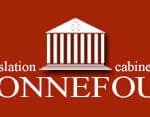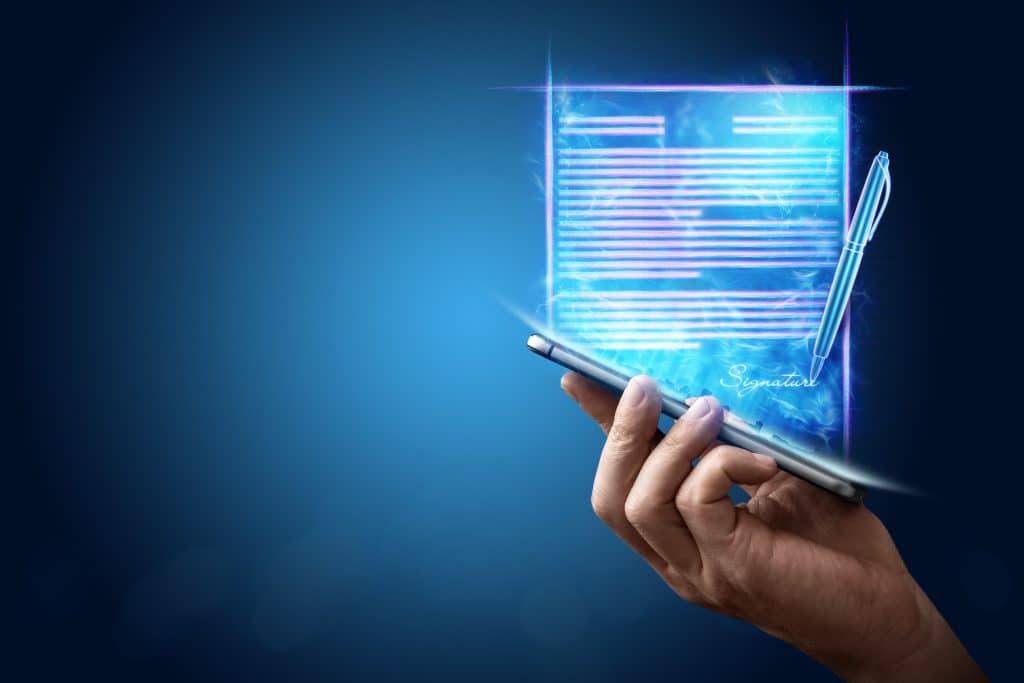Like other professionals, notaries have entered the era of digitalization. In fact, the dematerialisation of authenticated notarial acts has been ongoing for more than ten years in France. Notary offices are now using the electronic authentic act (EAA). What is it? What are the advantages and disadvantages for those who practice this profession? Let’s take a look!
Electronic Authentic Act (AEE): what is it?
As provided for by the Act of 13 March 2000 and the implementing decree of 10 August 2005, an authenticated notarial deed can be drawn up and signed in electronic form (digital tablet). This electronic authentic act (AEE) retains all its legal qualities.
Indeed, according to article 1366 of the French Civil Code the AEE has exactly the same value as a paper document, i.e.:
- A definite date. This is an indisputable date (because it is official and binding on all parties) from which it is possible to assert one’s rights.
- Its evidential value. As the content and form are validated by the signature of the notary, the authentic instrument is an indisputable piece of evidence.
- Its enforceability. The authentic instrument has the same legal value as a court decision, both in France and in Europe.
But for this to happen, all electronic authentic instruments must comply with the conditions set out by the regulations concerning:
- The use of a qualified electronic signature process. The notary must use a Real key. This USB-like computer key is encrypted: it contains the notary’s identification and signature data. This tool guarantees the authenticity of the deed, by certifying the signature and making it inviolable.
- The establishment and conservation of each act with enhanced security. Authentic instruments in electronic form must be transmitted, enregistered and stored in the MICEN (Minutier central électronique des notaires de France). Managed by the Conseil Supérieur du Notariat (CSN), it is a secure server dedicated to the centralised storage of notarial acts on a national scale. Thanks to this electronic safe, the deed can only be accessed by the signing notary. Only they can consult it or edit copies at any time.
Did you know… The first electronic authentic instrument was signed in 2008.
The procedure for signing an authentic instrument in electronic form
The signing of a AAE is as follows:
- Prior to the appointment with the clients, the notary drafts the deed using the usual drafting software that would be used for authentic instruments on paper. The notary then scans the annexes to the deed.
- At the time of signing in the notary’s office, the deed is projected on a screen, allowing the various parties involved to see it. The notary reads it out.
- Changes can be made in real time.
- Once the content of the deed and the annexes have been validated by the notary, the clients sign directly on the digital tablet. A single signature is sufficient, without the need to initial and sign each page.
- It is then up to the notary to affix his or her own secure electronic signature using the Real key to authenticate the deed.
- The document is then automatically sent, enregistered and stored at the MICEN.
- In addition to the paper copy, the various parties can obtain a copy of the document electronically.
Electronic authentic instruments: new practices
In the world of the notary’s office, the digital revolution is underway and is profoundly changing the way the profession is practised.
New practices are emerging:
- The Remote Electronic Authentic Act (AAED). By using an approved videoconferencing system, notaries can have documents signed from their respective offices in the presence of their clients.
- The Authentic Act by Remote Court Appearance (AACD). This exceptional measure was put in place at the beginning of the health crisis to allow notaries to continue to carry out their activity during complete lockdown for certain acts: single donations, sale in the future state of completion (VEFA)… It ended in August 2020.
- Notarial Power of Attorney by Remote Court Appearance. It was introduced by the decree of 20 November 2020 to perpetuate the practice implemented during periods of lockdown. It allows a notary to draw up authentic powers of attorney electronically when the parties involved are not present in the notary office.
Did you know... The Paris Chamber of Notaries offers an electronic notarial filing service for businesses and professionals. It is a secure electronic safe under the exclusive control of the clients’ notary. It allows for the reliable storage of different types of documents, the proof of ownership of data at a certain date (incontestable proof) and the guarantee of the return of deposited documents to the rightful owners on request.
Advantages and disadvantages of the AAE
The advantages
A real revolution for notaries, the AAE has many advantages, both for notaries and their clients:
- Improve the speed of execution for each transaction. It significantly reduces the time spent on signing documents: only a few minutes compared to about twenty minutes for a paper document.
- Facilitate and accelerate the management and modification of acts being signed.
- Streamline exchanges between notaries and their clients through electronic submissions.
- Increase the security (legality, transfer, conservation, etc.) of authentic instruments thanks to efficient tools (Real key, MICEN).
- Improve accessibility of data which are centralised on a single secure server.
- Optimise storage space through secure digital archiving and reduction of paper archives.
- Limiting the environmental impact of file processing by reducing paper printing.
The constraints
The dematerialisation of authentic acts offers great prospects for notaries and their clients.
However, these new practices require legal professionals to become familiar with the use of digital tools approved by the reference body (CSN). And, of course, these require time and effort to master!
Notary offices must therefore be constantly trained and adapted to the new procedures inherent to digitalisation. But it is a challenge they are well able to meet.
Over the years, the use of electronic authentic instruments has become more widespread. A step forward that benefits both notaries and clients! But, this is not the only notable change in notarial offices. Other dematerialised services are gradually emerging, suggesting a real evolution of the profession in the short and medium term.

